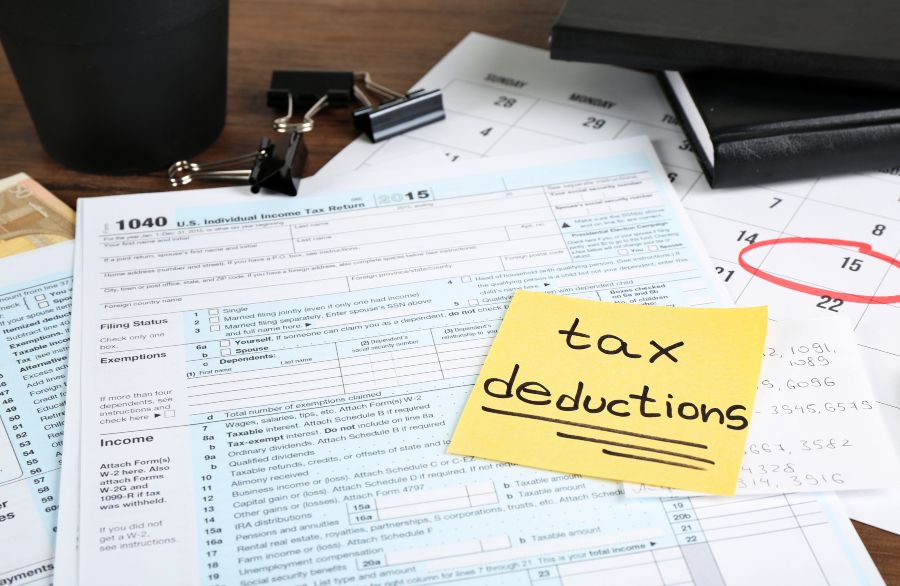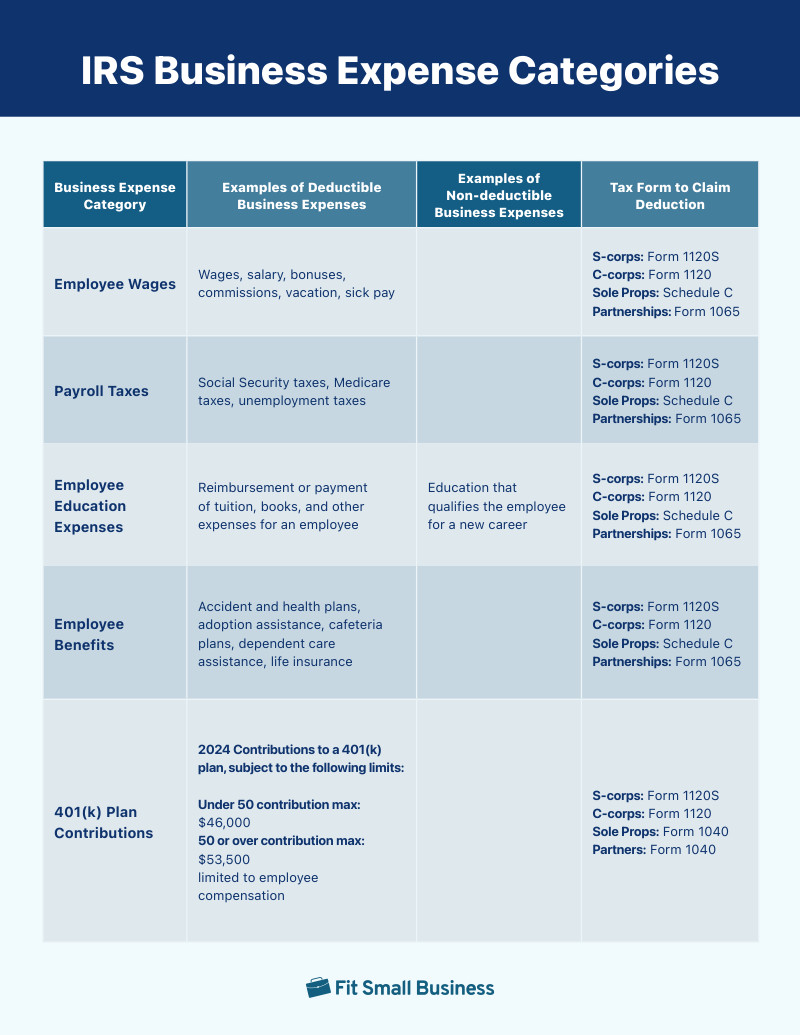The list below includes the most common business expense categories that a small business may encounter; it’s not an exhaustive list. In general, you may deduct expenses that are ordinary and necessary for your business. The IRS website defines “ordinary” as something common for your industry and “necessary” as something helpful and appropriate for your trade or business.
Download your free copy of our IRS Business Expense Categories. It is a great quick reference guide and includes:
- Examples of deductible business expenses in each category
- Examples of nondeductible business expenses by category
- Tax forms you need to complete to claim the deduction
Identifying every available deduction is an important part of calculating your small business taxes. Below, you will find a detailed description of what’s included in each business expense category and how to qualify for the tax deduction.
Employee-related Expenses
1. Employee wages: You can deduct gross wages, salary, commission bonuses, or other compensation paid to your employees. This includes wages paid to a spouse or children, provided they performed services for your business, the amount is fair, and the payments were made through payroll. Sole proprietors reporting on Schedule C cannot deduct amounts paid to themselves, but S corporations (S-corps) can deduct wages paid to their shareholders or managers.
2. Payroll taxes: Employment taxes paid on behalf of your employees are a deductible business expense. This includes Social Security, Medicare, and federal and state unemployment taxes.
3. Employee education expenses: Payments made to employees for reimbursement of tuition, books, and other materials are deductible. Education expenses must be required by you, serve a bona fide purpose of your business, and maintain or improve your employees’ skills to be deductible. They cannot qualify your employee for a new career. Learn more about deductible education expenses.
4. Employee benefits: Payments made on behalf of employees to cover the following programs are tax-deductible:
- Accident and health plans
- Adoption assistance
- Cafeteria plans
- Dependent care assistance
- Life insurance
5. 401(k) plan contributions: Your employer contribution to employee 401(k) plans is tax-deductible. See our article on how to set up a solo 401(k) for guidance on the process.
6. Travel, meals, and lodging to employees: Reimbursements to employees for travel, meals, and lodging for business travel are deductible.
Our related resources:
Property-related Expenses
7. Rent or lease payments: Payments made to rent office space, equipment, or a warehouse for inventory and supplies and to vehicle lease payments are all tax-deductible. A Schedule C business (or sole proprietor) cannot rent property from the business owner. However, an S-corp or C corporation (C-corp) is allowed to rent property from the shareholders—as long as the amount is fair.
8. Taxes for leased business property: In addition to rent payments, sometimes lessors require tenants to pay taxes on leased office space, equipment, and vehicles used for business purposes. These tax payments are deductible business expenses.
9. Personal property taxes: Personal property taxes paid on business property are deductible. “Personal” in this context refers to property that can be removed from the business without damaging it, as opposed to real property. Some examples of personal property are office furniture, machinery, and equipment.
10. Depreciable assets: Purchases made for furniture, equipment, and machinery typically must be depreciated over the number of years they are expected to last. However, most small businesses will be able to deduct 60% (80% in 2023) of furniture, equipment, and machinery purchased in 2024 with the use of bonus depreciation. Alternatively, many assets can be completely deducted in the year purchased with a Section 179 election.
Our related resources:
Operating Expenses
11. Repairs: Minor repairs to your office, such as painting and plumbing leaks, are deductible business expenses. However, major repairs that will increase the value of the property must be capitalized and depreciated. If you were to replace a roof, heating, ventilation, or air conditioning (HVAC) system, those expenses would need to be capitalized.
12. Subscriptions: Subscriptions to magazines and journals that are related to your business are tax-deductible. Personal magazine subscriptions are not tax-deductible.
13. Advertising and marketing costs: Expenses incurred to promote your business are deductible business expenses. This includes business cards, flyers, websites, and fees paid to email marketing companies for promotional emails.
14. Supplies and materials: Supplies used in your business are tax-deductible. This includes:
- Paper
- Ink for printer
- Pens, pencils, and notepads
- Cleaning supplies
- Books and manuals
15. Inventory: If you are in the business of selling a product, you will either need to purchase merchandise to resell or buy materials to produce items for sale. The goods you buy for resale or production are called inventory. Inventory is initially recorded on the books of a business as an asset, but the inventory asset is expensed when items are sold.
16. Utilities: Payments made for electricity, telephone, and gas for your office space are deductible business expenses. Monthly service fees paid for telephone service in a commercial office space are also tax-deductible.
If you have a home office, you are not allowed to deduct the basic telephone service charges and taxes for the first line in your home. However, any subsequent telephone lines added for business use are deductible business expenses.
17. Car and truck expenses: If you use your vehicle for business, you can deduct 67 cents per business mile for 2024, or you can deduct a portion of vehicle-related expenses like gas, repairs, car washes, parking fees, and tolls.
18. Club dues and membership fees: Membership dues paid to the chamber of commerce and other professional/trade associations of which you are a member are deductible business expenses.
Fees paid for the following are not tax-deductible:
- Country clubs
- Golf and athletic clubs
- Hotel clubs
- Sporting clubs
- Airline clubs
19. Franchise, trademark, and trade name: Fees paid to purchase a franchise, trademark, or trade name are tax-deductible business expenses.
20. Interview expense allowances: Any payments made on behalf of a prospective employee during the interview process are deductible business expenses. This includes travel costs (like airfare and lodging for candidates who are from out of town), parking fees, and other costs. Meals are also deductible up to 50% of the cost.
21. Legal and professional fees: Payments made to attorneys, certified public accountants (CPAs), financial planners, or other professionals for your business are deductible business expenses.
22. Tax preparation fees: Fees paid to a tax preparer to prepare your tax return are tax-deductible. If you prepare your own taxes using tax software, the amounts paid to purchase the software and e-file your federal and state tax returns are also deductible business expenses.
23. License and permits: Payments for a business license, liquor license, real estate agent license, and other permits required for your trade or business are all tax-deductible business expenses.
Special Deductions
24. Insurance premiums: Premiums paid to protect your business against loss or theft are deductible business expenses. This includes:
- Natural disasters like hurricanes, earthquakes, and floods
- Business bad debt
- Liability insurance
- Malpractice
- Workers’ compensation insurance
- Life insurance
- Insurance on vehicles used for business
25. Self-employed health insurance: If you are self-employed, payments made for medical, dental, and qualified long-term care insurance for yourself, your spouse, and your dependents are deductible. The premiums are not deductible on Schedule C like other business expenses, but rather Form 1040, Schedule 1, line 17 as an adjustment to income.
26. Home office: You can deduct $5 per square foot of office space, up to a maximum of 300 square feet. If you prefer, you may deduct a portion of your actual household expenses based on the percentage that you use your home for business. This includes:
- Utilities
- Real estate taxes
- Insurance
- Deductible mortgage interest
Our related resources:
27. Interest on trade or business debt: Interest payments that are made on loans, lines of credit, and other business liabilities are tax-deductible. Interest on income tax debt, life insurance loans, and personal credit card interest are not deductible business expenses.
28. Business startup costs and organizational costs: Costs incurred to get your business up and running are deductible business expenses. Within the first year, you can deduct up to $5,000 for startup costs and $5,000 for organizational costs. Any amount of more than $5,000 can be amortized over a 15-year period.
29. Bad business debts: If you use the accrual basis of accounting, you record income as soon as a service is provided and the customer owes you money. If you are later unable to collect from the customer, you can deduct the amount as a business bad debt. Businesses using the cash basis of accounting don’t record income until the cash is received, so there is no bad debt to deduct.
You may also like:
30. Removal of barriers for the disabled: You may be able to deduct money paid to remove architectural or transportation barriers that your business may have so that the elderly or disabled can access the property. The maximum deduction for this expense is $15,000.
In connection with this expense, you may also be able to claim the Disabled Access Credit or the Work Opportunity Tax Credit (WOTC) for hiring disabled workers. For more on this, read our guide on how to claim the tax credit for hiring disabled workers.
31. Payments to 1099 contractors: Payments made to independent contractors (1099 workers) that provide goods and services to your business are tax-deductible. IRS Form 1099-NEC should be issued to any nonemployee who was paid $600 or more for services.
32. Client gifts: You can deduct up to $25 for each client gift that you purchase. This can include gift card purchases, gift baskets, or other items.
33. Continuing education: You can deduct payments for registration fees and materials for seminars and courses that you and your employees attend as part of continuing education credits for your trade or business.
34. Charitable contributions: A business can deduct up to 60% of the owner’s adjusted gross income as charitable contributions. However, be sure to adhere to the following guidelines:
- For contributions of $250 or more, you must obtain a letter from the organization that includes the amount of the gift and whether or not you received any goods or services in exchange for the donation.
- Volunteered services are not deductible; however, you can deduct costs incurred while volunteering like supplies purchased
- Mileage incurred while volunteering is deductible at 14 cents per mile for 2024
- Donations of goods, services, or property are deductible
35. Net Operating Loss (NOL): When a company has more expenses than income in a year, the leftover losses can be used in a future year to offset income.
36. Energy-efficient commercial buildings deduction: Property owners and designers who enhance commercial buildings with energy-efficient property are eligible for a deduction. If you’d like to learn more about the form used to claim the credit, read our article, What Is Form 7205 (+ Example).
37. Qualified Business Income Deduction (QBID): QBID, also known as the Section 199A deduction, is a 20% reduction in the amount of specific kinds of income subject to tax. QBI includes specific kinds of gains, deductions, and losses from businesses in certain categories. Income from pass-through entities (S-corps, sole proprietorships, and certain trusts) is included in the QBID calculation.
Taxes—Other Than Property
38. Excise taxes: If you purchase alcohol, tobacco, or fuel for your business, you may be required to pay excise taxes. The good news is that you can deduct excise taxes on your tax return.
39. State taxes: State and municipal taxes can be deducted for federal income tax purposes but are currently limited to a maximum deduction of $10,000. Many states have changed their laws to include a pass-through entity tax, which is a method of side-stepping the federal limit. These laws have redefined state and local tax as a direct reduction to income instead of being subject to the limitations that state and local tax would ordinarily be subject to.
40. Sales tax: Businesses are permitted to deduct sales tax on qualifying expenditures. Generally, the amount of the sales tax is added to the cost of the purchase rather than shown as a separate expense.
Nondeductible Expenses
41. Penalties and fines: Penalties paid for late performance or nonperformance of a contract are deductible. However, penalties and fines for breaking a law, such as speeding or filing a tax return late, are not deductible even if business-related. Bribes, kickbacks, and other illegal payments are not deductible.
While this may seem intuitive, sometimes these payments are rolled in with legitimate account activity. Upon audit, these payments may be disallowed, and the total tax may be recalculated by the IRS.
42. Business-related entertainment: Business-related entertainment (including facility and venue costs) is not a deductible expense. Business meals at an entertainment event may be deducted as long as the meals are separately itemized from the rest of the entertainment expenses.
Criteria for Deductible Business Expense Categories
A business expense category is an organized way to group business expenses for tax reporting purposes. It’s important to know what types of expenses are included in a category so that you can apply the appropriate rules when it comes to deducting expenses on your tax return.
Instead of providing a master list that includes everything a business can deduct, the IRS has defined a business expense as meeting two requirements:
- Incurred in a trade or business: A trade or business must be profit-motivated. You must plan and have the ability to make a profit, even if that profit never actually occurs. If the IRS doesn’t believe you ever intended to make a profit, the agency will label your business a hobby and disallow your expenses. For more information on how to avoid this classification, read our article on IRS Hobby Loss Rules & Tips to Avoid Them.
- Ordinary and necessary: As referenced previously, per the IRS, “An ordinary expense is one that is common and accepted in your trade or business. A necessary expense is one that is helpful and appropriate for your trade or business.”
For additional information, read IRS Publication 535: Business Expenses. It is one of the most comprehensive resources on what business expenses are, the qualifications that must be met, and what is and is not deductible.
Frequently Asked Questions (FAQs)
In general, if an expense is ordinary and necessary for you to conduct business, it can be written off as a business expense.
A good rule of thumb when it comes to what you cannot write off as a business expense is anything that is considered or can be interpreted to be a personal expense. In addition, the following expenses are always nondeductible:
- Penalties and fines for violating a law
- Illegal payments such as bribes
- Entertainment, even if connected to business such as entertaining a client
- Country club dues
For years 2018 and later, employee business expenses are no longer deductible. However, they are deductible by the employer if they reimburse the employee.
The 12-month rule allows you to deduct a prepaid future expense in the current year if the expense is for a benefit that lasts no longer than 12 months or until the end of the tax year after the tax year in which you paid for it.
Bottom Line
The IRS allows deductions for ordinary and necessary expenses paid for your business. For proof that your expenditures meet those qualifications, you’ll need to ensure that your business records are consistent with the definition of “ordinary and necessary.” To meet this criteria, the expenses you deduct should be useful, appropriate, and common for your line of business.



